Mental Health First Aid

About Course
Become a beacon of support in a world that needs it most.
Have you ever felt that a friend, colleague, or family member wasn’t quite themselves, but you were frozen by the fear of saying the wrong thing? Have you witnessed someone struggling with overwhelming stress or anxiety and wished you knew how to help?
Just as CPR empowers you to assist an individual having a heart attack, Mental Health First Aid (MHFA) equips you with the skills to assist someone experiencing a mental health or substance use-related crisis. This course is designed to strip away the fear and uncertainty, replacing it with a clear action plan and the confidence to respond with compassion and competence.
This is not a course to become a therapist. It is a course to become a vital first responder in a person’s moment of need. You will learn to be a crucial bridge, guiding someone from a place of crisis toward the professional support they deserve.
Throughout this comprehensive program, you will gain the essential skills to:
-
Recognize Early Signs: Learn to identify the subtle but critical warning signs of mental health challenges and substance use disorders in adults.
-
Listen to Understand: Master the art of empathetic listening and non-judgmental communication to create a safe space for someone to share their story.
-
Provide Immediate Support: Gain practical tools, including grounding techniques for anxiety and a step-by-step framework for crisis situations.
-
Respond to a Crisis: Learn how to calmly and safely respond to a panic attack or a suicidal crisis, knowing what to say and do until professional help arrives.
-
Connect to Help: Understand the landscape of mental health care and how to effectively guide someone toward the appropriate professional, peer, and self-help resources.
Who is this course for?
This course is for anyone who wants to make a difference. It is essential training for:
-
Managers, supervisors, and HR professionals
-
Educators and school staff
-
Parents and family members
-
Community and faith leaders
-
First responders and public service members
-
…and any individual who wants to be a pillar of support in their community.
Mental health challenges are a part of the human experience. Being equipped to respond is one of the most powerful and important skills you can possess in today’s world.
Enroll today and become a vital link in the chain of care. You can be the one who makes a difference.
Course Content
Recognizing Mental Health Challenges
-
Detailed Lesson Content
-
When you notice a change, it will likely fall into one or more of these four categories.
-
Key Takeaways/Summary
Basic Psychological Support Skills
Stress and Anxiety Management
Suicide Prevention and Crisis Response
Communication and Listening Skills
Referral and Support Systems
Assessment: Scenario-based roleplay + written test
Final Exam
Certification: Mental Health First Aider (MHFA)
Student Ratings & Reviews
